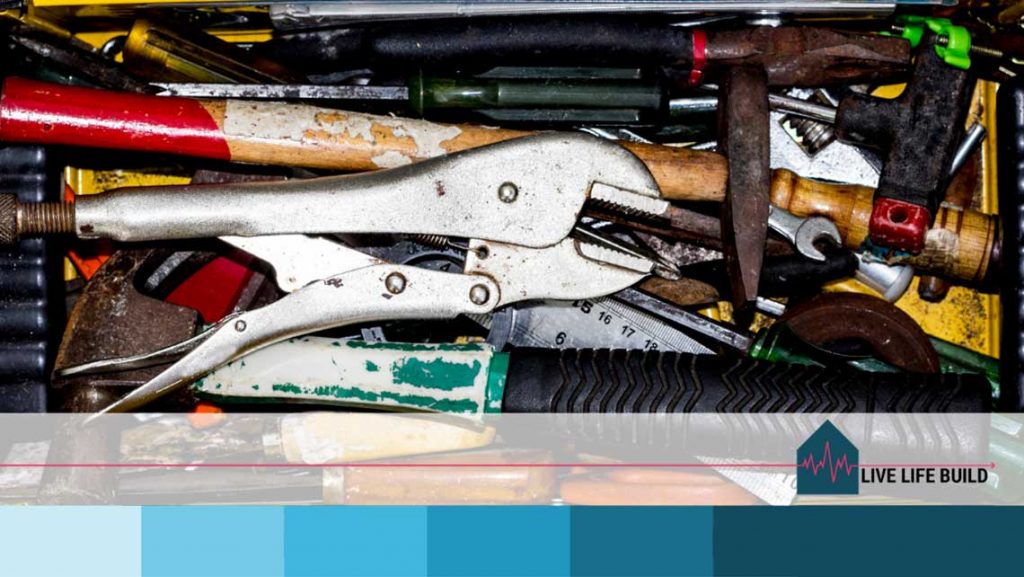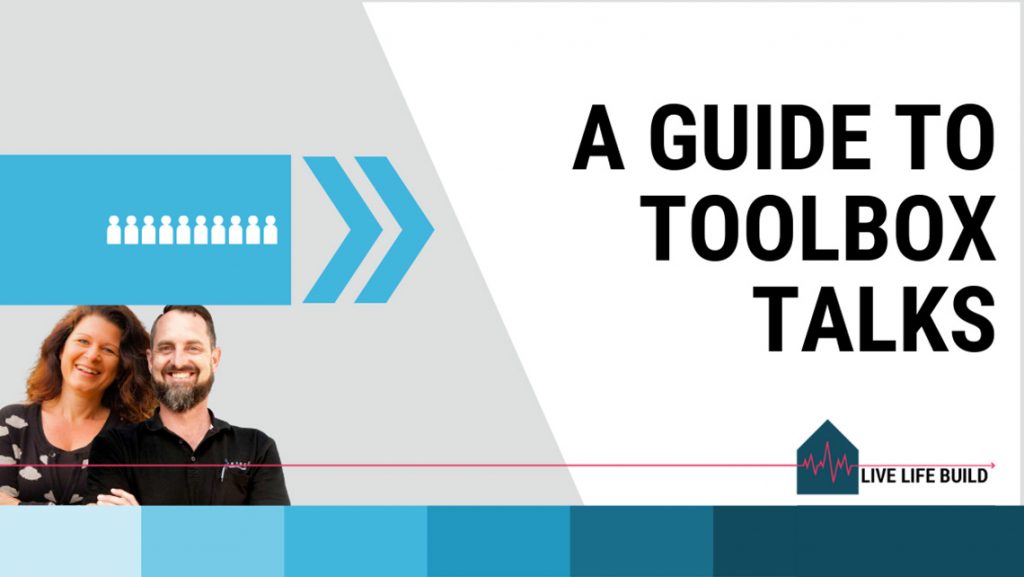What is a Toolbox Talk, and why should you start doing them?
And if you’re already doing them, what should you include so they’re a great tool for your business?
In this blog, we take you through the 5, 4, 3, 2, 1 of Toolbox Talks, and how fantastic they can be for improving your business, streamlining your projects, creating a better team environment, and adding value to your projects and client relationships.
Do you conduct regular Toolbox Talks in your business?
Many builders we speak with will have some version of a Toolbox Talk. However, where it falls over is that it’s not regular, there’s no consistency, and it’s not happening at all levels in their business.
And so, if this is how Toolbox Talks work in your business, you’re really missing out on the opportunity to grow and improve your business through running these meetings more regularly, and with a better structure.
Toolbox Talks are not just for big operations, or corporate-style businesses. Even the smallest building business can benefit dramatically from having and using regular Toolbox Talks.
Read on, as Duayne outlines how he structures Toolbox Talks to improve his business, grow his own leadership, and also to support and empower his team. Which ultimately means his business can deliver high quality results in its projects and add great value for all involved.
Check out our 5, 4, 3, 2, 1 of our 6P Methodology PEOPLE: What is a Toolbox Talk and why should you start doing them.
5. TOOLBOX TALKS: WHAT ARE THEY AND WHY ARE THEY IMPORTANT?
When you mention ‘Toolbox Talk’ to somebody in the construction industry, they genuinely think that it is something only done by the larger companies as an informal meeting to discuss safety issues.
This is true, however a Toolbox Talk can be a great way for smaller building businesses to have regular communication with staff, contractors and even suppliers.
A Toolbox Talk can be a great way to discuss all types of things with your team.
During a Toolbox Talk you can discuss things such as:
- productivity
- types of products and materials that are getting used
- Timelines
- team environment
- getting feedback from your staff and contractors about what’s happening on site
- and all types of things.
A Toolbox Talk can also be an incredible way to build a better relationship with your team. You can get to know each other better by using the time to check in on them, talk about their hobbies and maybe even what they have done on the weekend.
We believe a Toolbox Talk does not have to be all about your business. More importantly, it can be used as a really great tool to improve the team environment.
By using some of this time to have a laugh, and having some general discussion on things that are happening in everybody’s life, your team will see you as not only their boss, but someone who cares about what is really going on in their lives and is interested in them.
Using a Toolbox Talk to discuss these types of things is really important as it shows that you are far more than just the owner of the business. You are a leader. You are setting an example for what is expected. You care about your people and it shows that you don’t know everything, and you are open to your team’s input.
Regular Toolbox Talks are a great way to improve everything about your building business.

4. TOOLBOX TALKS: HOW OFTEN, WHO RUNS THEM AND WHAT SHOULD YOU DISCUSS?
The more often you have tool box talks, the better your building business will perform.
Like everything in life, to get the best outcome, the key is in having great communication. The best way to achieve this on a construction site is by having regular Toolbox Talks with your team on site.
With my own building business, I try to catch up with my teams at least once a week, and discuss what is happening on site. This is normally on the day that I’m on site having my weekly site meetings with my clients. I schedule in enough time (either before my site meeting with the client or after it) to spend some time with whoever is on site to discuss.
During these Toolbox Talks, we discuss:
- where things are at
- the job schedule
- priority tasks
- any deliveries that may be coming or that haven’t shown up
- and depending on what stage the job is at, we may even spend some time having a group discussion about the best way to achieve the end result that we are after.
Also, I’ll always spend some time checking in on each of my team, and asking them how they are doing .
Something else that I think it’s really important to discuss with your team on a regular basis, is what work your company has in the pipeline. SO, this includes discussion about any projects that will be starting soon and a little bit about what’s happening in the industry.
I find this makes my team comfortable, knowing that they have continued quality work and I’m working hard to keep them employed. For a lot of people in our industry, it can be a huge thing to just know that they have the commitment from their employer to keep them employed so that they can pay their bills.
On top of this, I really encourage my teams to have their own Toolbox Talks with each other on a daily basis.
I think it’s really important for every team member on site to know exactly what is expected to be done each day. To achieve this, I’m always encouraging my Lead Carpenters to take 10 to 15 minutes each morning to run over who is doing what, and what they expect to get done during the day. I think this is incredibly important, especially for the young apprentices. Because if they don’t know what is coming up once they have finished what they are currently doing, it’s really hard for them to learn how to be constantly thinking ahead, so that they can be more efficient.
It’s also really important, especially if you have a building business that is large enough to have supervisors or project managers, that these team members are also having regular Toolbox Talks with their site teams. This helps ensure the right information is communicated to the right people, and the right people are doing the right task. Also, Toolbox Talks done this way, will help the entire team to have a better relationship with each other.

3. TOOLBOX TALKS: HELPING AND IMPROVING TEAM MOTIVATION
One of the reasons that I’m such a fan of Toolbox Talks is this: I think back to when I was an apprentice, and even when I was a Subcontracting Carpenter.
You may be familiar with this too. I found that there was very little, if any, communication from the site foreman, other on-site carpenters or the Builder to inform me about what I was meant to do. We were always expected to know what we were meant to be doing, and how we were meant to be doing it. And you just knew that you had to get it done as quickly as you possibly could.
There was no communication about the job scheduling and if something should have been getting prioritised over something else, so it could be ready for the following trade.
I remember having to ask lots of questions in an effort to figure out if I was doing the correct task, and if it was getting done the way the Builder wanted it to be done.
I remember always thinking to myself, “How the hell am I supposed to know what is meant to be happening on this site when no-one is communicating with me?” I think this is another area where the industry is very old-fashioned and broken.
It wasn’t until I started running my own carpentry gang that I realised how valuable Toolbox Talks were in making my team efficient.
My team grew very quickly and we used to take on very large contracts. It wasn’t long before I realised the only way to get my team on the same page as me, was to have a pre-start meeting every single day.
This allowed me to discuss with my team exactly what I expected all of us to get done for the day. By doing this simple step first thing, it eliminated a lot of unnecessary wasted time during the day, and avoided team members having to figure out what they were doing next, as everybody knew what I expected.
Having regular Toolbox Talks with your team is not only about making them more productive. It will also keep them motivated as everyone will be on the same page and understand the expectations you have.
You can use these regular meetings to discuss what is happening on the site, AND also be using the time to get to know your team more intimately.
By doing this, you will find that your team will start working together a lot better and be open to more communication with you about what is happening on site.
These days I’m really aware that for my business to operate better, I have to be listening to the people that are working in it.
It’s not just about what I think and what I want. It’s also about making sure I’m understanding what my team members are thinking about my business.
It’s very empowering for your team when you open the doors and allow them to have input into how things should be done onsite, and providing feedback that you’re scheduling the jobs correctly, and the way materials are ordered etc.
However, most importantly, by doing this, you show them that you appreciate their ideas and concerns.

2. TOOLBOX TALKS: WHO IS IN CHARGE AND WHAT IS YOUR CULTURE?
Once your building business starts to grow, you’ll find you end up spending more time working ON the business, rather than spending time on the tools, on your the job sites.
Because of this, and as we’ve previously mentioned, Toolbox Talks can be the best way to communicate with your team on a regular basis. However, it’s also important that you discuss roles and responsibilities, so there’s clarity for your team. This can include:
Who is in charge of the job site?
As you grow, you’ll most likely end up with a team of carpenters. To be the most productive there needs to be ONE person in charge. More than one, and it can get confusing and problematic. I must admit, I still get situations in my building business where occasionally we end up with too many people in charge of one job.
So it’s really important to make sure you’re having regular communication and letting the team know who is in charge. You may end up in situations where you end up with multiple teams on the one project. So making sure all the carpenters know who is in charge of each team is really important.
What are the roles?
It’s also really important to make sure the team members all know exactly what their roles are and who is doing what.
I believe that everything on a job site can be turned into a system or a process just like a car getting made in a factory.
Think about the task that is needing to be completed. Then work with each other to make sure that everyone is performing the roles that they are best suited to.
These roles can be changed around as apprentices get more skills and the tradesman can let them step up.
What are the teams’ responsibilities?
Make sure the team knows their responsibilities in regards to ordering materials, updating the site supervisor, thinking ahead and making sure that everything is organised for the next few days.
This will help you ensure that, when one task is finished, the materials are on site to be able to move on to the next task. Also determine how often the site is to be cleaned, and who is responsible.
Set expectations and drive your culture
It’s really important that during your Toolbox Talks, you continually talk to your team about your business values.
This doesn’t mean you have to be discussing your business mission statement. It just means that when you’re discussing what is happening on the site, you’re always mentioning some key points.
In my building business I have three points that I repeat regularly:
- Near enough is not good enough
- The business is built completely on the quality of the homes that we build
- The most important thing is that we deliver all of our clients quality defect free homes.
Reiterate to your team the importance of quality and what you expect.
Be a leader and hold your team accountable
It’s also really important to make sure you’re firm when needed during your Toolbox Talks. Don’t avoid discussions about:
- If someone isn’t performing to the best ability and letting the team down
- If the team is not working well together
- If your projects are not running to schedule
Wherever there are issues, you should be discussing this with your team. Don’t be afraid to have these conversations, because if you keep letting things happen that shouldn’t be happening, it doesn’t take long for the wheels to fall off the cart.
Remember your Toolbox Talks can be one of the easiest and simplest ways to grow and improve your business, as it lets everybody in your team understand who you are, the company values and what is expected of them.

1. TOOLBOX TALKS: OUTCOMES
Once you get into the habit of having regular Toolbox Talks with your team, you will start to pick up on areas of a business that need improvement.
By taking the feedback from your team on site after each talk, you can start to make a meeting agenda for the following Toolbox Talk.
You can even ask your team for input on topics that they might wish to discuss at the next toolbox meeting as well.
After a toolbox talk with you, every member of the team should have a clear understanding of:
- Who is responsible for the task for the following days or week
- What is expected of the team
- What tasks should be prioritise ahead of other trades
- Is the job on schedule and what needs to happen next
- Any deliveries that may be coming or need to be ordered
- Any issues that may have been happening on site and how to resolve them
- The next stages of work and what they should be preparing for
Remember getting your team in the habit of having their own Toolbox Talks is really important.
They should be having daily toolbox talks to establish things such as:
- Where did they get to the day before
- What needs to happen today
- What member of the team is doing what task
- Do they need to order more material for the following day or week
- Are they on track and do they need to speed up a little bit
One thing that I’ve found works really well to help manage the discussions during a Toolbox Talk is a site whiteboard.
We have large whiteboards on all of our job sites that myself and other members of the team can update with notes from our Toolbox Talks.
This not only gives our site teams something to reference and look back at, but also looks really professional for our clients, as when they are on site, they can see that we are organised.
Ultimately, you can use Toolbox Talks to:
- improve your business
- improve your team
- improve productivity
- get to know your team more personally, and
- add value to every project you do for your clients.

So, here’s our 5, 4, 3, 2, 1 to identify your ideal project.
5. Have you asked your team what their goals are?
4. How can you help and facilitate your team’s goals?
3. What are your goals as a team?
2. Holding people accountable.
1. Celebrate the wins and create a good work environment.
Live Life Build’s 6P Methodology unlocks the 6 ways to elevate your building business:
PERSONAL | PROJECTS | PEOPLE | PARTNERSHIPS | PROCESSES | PROFESSIONAL
Are you doing regular Toolbox Talks? And could you be doing them better?

